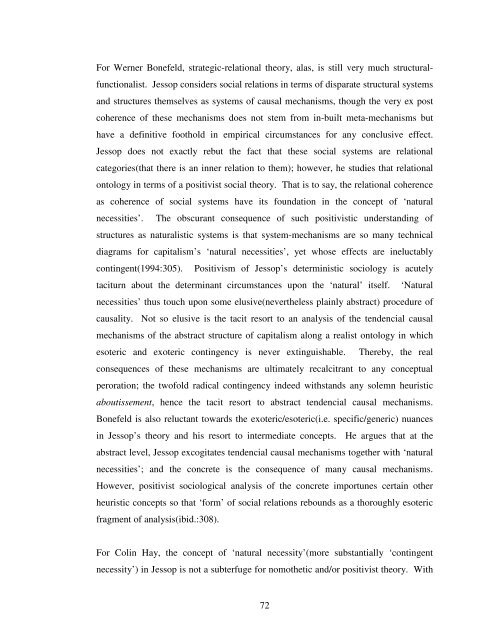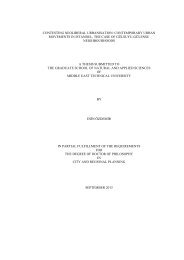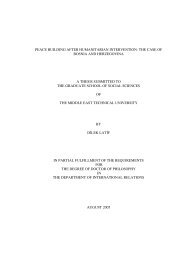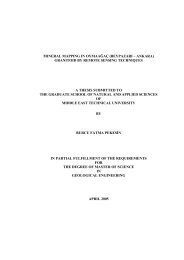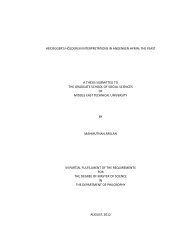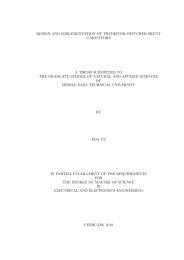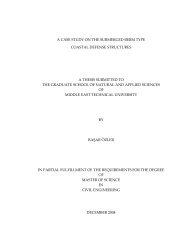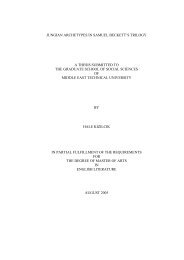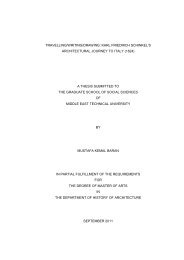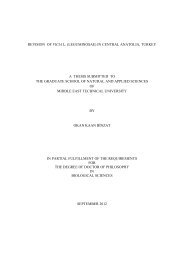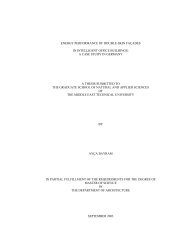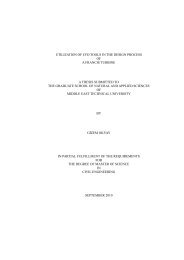View Original - Middle East Technical University
View Original - Middle East Technical University
View Original - Middle East Technical University
You also want an ePaper? Increase the reach of your titles
YUMPU automatically turns print PDFs into web optimized ePapers that Google loves.
For Werner Bonefeld, strategic-relational theory, alas, is still very much structural-<br />
functionalist. Jessop considers social relations in terms of disparate structural systems<br />
and structures themselves as systems of causal mechanisms, though the very ex post<br />
coherence of these mechanisms does not stem from in-built meta-mechanisms but<br />
have a definitive foothold in empirical circumstances for any conclusive effect.<br />
Jessop does not exactly rebut the fact that these social systems are relational<br />
categories(that there is an inner relation to them); however, he studies that relational<br />
ontology in terms of a positivist social theory. That is to say, the relational coherence<br />
as coherence of social systems have its foundation in the concept of ‘natural<br />
necessities’. The obscurant consequence of such positivistic understanding of<br />
structures as naturalistic systems is that system-mechanisms are so many technical<br />
diagrams for capitalism’s ‘natural necessities’, yet whose effects are ineluctably<br />
contingent(1994:305). Positivism of Jessop’s deterministic sociology is acutely<br />
taciturn about the determinant circumstances upon the ‘natural’ itself. ‘Natural<br />
necessities’ thus touch upon some elusive(nevertheless plainly abstract) procedure of<br />
causality. Not so elusive is the tacit resort to an analysis of the tendencial causal<br />
mechanisms of the abstract structure of capitalism along a realist ontology in which<br />
esoteric and exoteric contingency is never extinguishable. Thereby, the real<br />
consequences of these mechanisms are ultimately recalcitrant to any conceptual<br />
peroration; the twofold radical contingency indeed withstands any solemn heuristic<br />
aboutissement, hence the tacit resort to abstract tendencial causal mechanisms.<br />
Bonefeld is also reluctant towards the exoteric/esoteric(i.e. specific/generic) nuances<br />
in Jessop’s theory and his resort to intermediate concepts. He argues that at the<br />
abstract level, Jessop excogitates tendencial causal mechanisms together with ‘natural<br />
necessities’; and the concrete is the consequence of many causal mechanisms.<br />
However, positivist sociological analysis of the concrete importunes certain other<br />
heuristic concepts so that ‘form’ of social relations rebounds as a thoroughly esoteric<br />
fragment of analysis(ibid.:308).<br />
For Colin Hay, the concept of ‘natural necessity’(more substantially ‘contingent<br />
necessity’) in Jessop is not a subterfuge for nomothetic and/or positivist theory. With<br />
72


